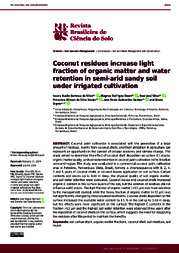Coconut residues increase light fraction of organic matter and water retention in semi-arid sandy soil under irrigated cultivation.
Coconut residues increase light fraction of organic matter and water retention in semi-arid sandy soil under irrigated cultivation.
Author(s): SILVA, I. E. B. da; DEON, M. D. I.; SILVA, D. J.; XAVIER, F. A. da S.; SANTOS, A. P. G.; SIGNOR, D.
Summary: Coconut palm cultivation is associated with the generation of a large amount of residues, mainly from coconut shells, and their utilization in agriculture can represent an opportunity in the context of circular economy and climate change. This study aimed to determine the effect of coconut shell deposition on carbon (C) stocks, organic matter quality, and soil water retention in coconut palm cultivation in the Brazilian semi-arid region. The study was conducted in a commercial coconut palm cultivation area in Petrolina, Pernambuco State, Brazil, forming a chronosequence with 0, 2, 4, 5 and 6 years of coconut shells or coconut leaves application on soil surface. Carbon contents and stocks up to 0.40 m deep, the physical quality of soil organic matter, and soil water retention were evaluated. Coconut leaves and coconut shells increased organic C content in the surface layers of the soil, but the addition of residues did not influence soil C stocks. The light fraction of organic matter (>53 µm) was more sensitive to the management studied, while the heavy fraction of organic matter (<53 µm) was not significantly changed by the evaluated treatments. Coconut shells deposition on the surface increased the available water content to 8.5 % in the soil up to 0.40 m deep, but the effects were more significant on the surface. The highest C contents in the fraction >53 µm and the highest soil water retention were observed three years after the deposition of coconut shells on the surface, which suggests the need for reapplying the residues after this period to maintain the benefits.
Publication year: 2024
Types of publication: Journal article
Unit: Embrapa Semi-arid Region
Observation
Some of Embrapa's publications are published as ePub files. To read them, use or download one of the following free software options to your computer or mobile device. Android: Google Play Books; IOS: iBooks; Windows and Linux: Calibre.
Access other publications
Access the Agricultural Research Database (BDPA) to consult Embrapa's full library collection and records.
Visit Embrapa Bookstore to purchase books and other publications sold by Embrapa.

